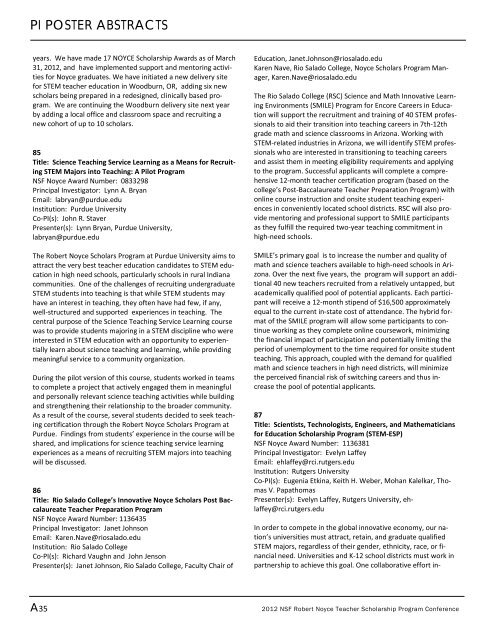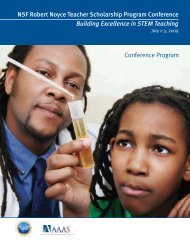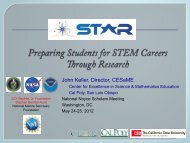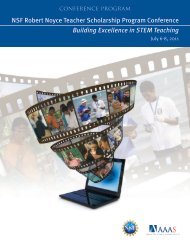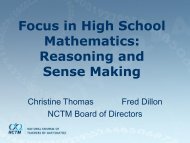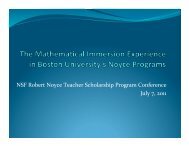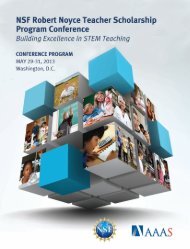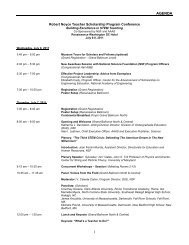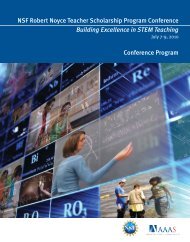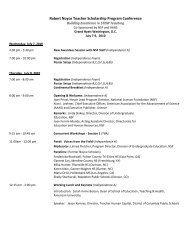PI POSTER ABSTRACTSyears. We have made 17 NOYCE <strong>Scholarship</strong> Awards as of March31, <strong>2012</strong>, and have implemented support and mentoring activitiesfor <strong>Noyce</strong> graduates. We have initiated a new delivery sitefor STEM teacher education in Woodburn, OR, adding six newscholars being prepared in a redesigned, clinically based program.We are continuing the Woodburn delivery site next yearby adding a local office and classroom space and recruiting anew cohort of up to 10 scholars.85Title: Science Teaching Service Learning as a Means for RecruitingSTEM Majors into Teaching: A Pilot <strong>Program</strong>NSF <strong>Noyce</strong> Award Number: 0833298Principal Investigator: Lynn A. BryanEmail: labryan@purdue.eduInstitution: Purdue UniversityCo‐PI(s): John R. StaverPresenter(s): Lynn Bryan, Purdue University,labryan@purdue.edu<strong>The</strong> <strong>Robert</strong> <strong>Noyce</strong> Scholars <strong>Program</strong> at Purdue University aims toattract the very best teacher education candidates to STEM educationin high need schools, particularly schools in rural Indianacommunities. One of the challenges of recruiting undergraduateSTEM students into teaching is that while STEM students mayhave an interest in teaching, they often have had few, if any,well‐structured and supported experiences in teaching. <strong>The</strong>central purpose of the Science Teaching Service Learning coursewas to provide students majoring in a STEM discipline who wereinterested in STEM education with an opportunity to experientiallylearn about science teaching and learning, while providingmeaningful service to a community organization.During the pilot version of this course, students worked in teamsto complete a project that actively engaged them in meaningfuland personally relevant science teaching activities while buildingand strengthening their relationship to the broader community.As a result of the course, several students decided to seek teachingcertification through the <strong>Robert</strong> <strong>Noyce</strong> Scholars <strong>Program</strong> atPurdue. Findings from students’ experience in the course will beshared, and implications for science teaching service learningexperiences as a means of recruiting STEM majors into teachingwill be discussed.86Title: Rio Salado College’s Innovative <strong>Noyce</strong> Scholars Post BaccalaureateTeacher Preparation <strong>Program</strong>NSF <strong>Noyce</strong> Award Number: 1136435Principal Investigator: Janet JohnsonEmail: Karen.Nave@riosalado.eduInstitution: Rio Salado CollegeCo‐PI(s): Richard Vaughn and John JensonPresenter(s): Janet Johnson, Rio Salado College, Faculty Chair ofEducation, Janet.Johnson@riosalado.eduKaren Nave, Rio Salado College, <strong>Noyce</strong> Scholars <strong>Program</strong> Manager,Karen.Nave@riosalado.edu<strong>The</strong> Rio Salado College (RSC) Science and Math Innovative LearningEnvironments (SMILE) <strong>Program</strong> for Encore Careers in Educationwill support the recruitment and training of 40 STEM professionalsto aid their transition into teaching careers in 7th‐12thgrade math and science classrooms in Arizona. Working withSTEM‐related industries in Arizona, we will identify STEM professionalswho are interested in transitioning to teaching careersand assist them in meeting eligibility requirements and applyingto the program. Successful applicants will complete a comprehensive12‐month teacher certification program (based on thecollege’s Post‐Baccalaureate Teacher Preparation <strong>Program</strong>) withonline course instruction and onsite student teaching experiencesin conveniently located school districts. RSC will also providementoring and professional support to SMILE participantsas they fulfill the required two‐year teaching commitment inhigh‐need schools.SMILE’s primary goal is to increase the number and quality ofmath and science teachers available to high‐need schools in Arizona.Over the next five years, the program will support an additional40 new teachers recruited from a relatively untapped, butacademically qualified pool of potential applicants. Each participantwill receive a 12‐month stipend of $16,500 approximatelyequal to the current in‐state cost of attendance. <strong>The</strong> hybrid formatof the SMILE program will allow some participants to continueworking as they complete online coursework, minimizingthe financial impact of participation and potentially limiting theperiod of unemployment to the time required for onsite studentteaching. This approach, coupled with the demand for qualifiedmath and science teachers in high need districts, will minimizethe perceived financial risk of switching careers and thus increasethe pool of potential applicants.87Title: Scientists, Technologists, Engineers, and Mathematiciansfor Education <strong>Scholarship</strong> <strong>Program</strong> (STEM‐ESP)NSF <strong>Noyce</strong> Award Number: 1136381Principal Investigator: Evelyn LaffeyEmail: ehlaffey@rci.rutgers.eduInstitution: Rutgers UniversityCo‐PI(s): Eugenia Etkina, Keith H. Weber, Mohan Kalelkar, ThomasV. PapathomasPresenter(s): Evelyn Laffey, Rutgers University, ehlaffey@rci.rutgers.eduIn order to compete in the global innovative economy, our nation’suniversities must attract, retain, and graduate qualifiedSTEM majors, regardless of their gender, ethnicity, race, or financialneed. Universities and K‐12 school districts must work inpartnership to achieve this goal. One collaborative effort in‐A35<strong>2012</strong> NSF <strong>Robert</strong> <strong>Noyce</strong> Teacher <strong>Scholarship</strong> <strong>Program</strong> <strong>Conference</strong>
PI POSTER ABSTRACTScludes the university working to graduate highly qualified mathand science teachers who will educate and mentor K‐12 studentsin high‐needs districts. National reports point to the critical needfor highly qualified math and science, especially physics, teachersto prepare the next generation of STEM professionals. Consequently,NJ issued Core Content Standards for Technology andEngineering.In response, high schools have started to offer engineering aspart of their optional curricula and are seeking ways to infuseengineering into existing curricula. To expand the pool of recruitsfor the STEM teaching positions, the Rutgers <strong>Noyce</strong> program,Scientists, Technologists, Engineers, and Mathematiciansfor Education <strong>Scholarship</strong> <strong>Program</strong> (STEM‐ESP), prepares engineeringand physics undergraduates to become our nation’sleading educational change agents.<strong>The</strong> goals of STEM‐ESP are to recruit, retain, and graduate acommunity of engineers and physicists who are dedicated toteaching physics, mathematics and engineering in high‐needs, K‐12 school districts. With an overarching theme of ”STEM for Humanity”,the project enhances Rutgers existing engineering andphysics undergraduate programs, as well as the graduate programsin mathematics and physical science teacher certificationprogram. Specifically, STEM‐E blends the physics and engineeringundergraduate programs with the existing graduate teacherpreparation programs, strengthens the focus on teaching physicsand mathematics to students in high‐needs districts and infusesthese programs with seminars that illustrate the great impactSTEM has on society. Ultimately, the STEM‐ESP Scholars willgraduate ready to teach in high‐needs K‐12 math and scienceclassrooms with strong pedagogical content knowledge anddeep understanding of the importance of STEM professionals.Since we are in our first year, the proposed poster will describeSTEM‐ESP components with a focus on the STEM for Humanitytheme.88Title: San Francisco State University <strong>Robert</strong> <strong>Noyce</strong> Teacher<strong>Scholarship</strong> <strong>Program</strong>NSF <strong>Noyce</strong> Award Number: 1136335Principal Investigator: Larry HorvathEmail: lhorvath@sfsu.eduInstitution: San Francisco State UniversityCo‐PI(s): Eric Hsu, Adrienne CoolPresenter(s): Larry Horvath, San Francisco State University,lhorvath@sfsu.eduSan Francisco State University (SFSU) will be offering a unified<strong>Noyce</strong> Fellows program with two tracks: one for junior and seniorundergraduate STEM majors, and another for postbaccalaureatestudents in SFSU’s year‐long credential program.Both tracks will participate equally in the Shared Core <strong>Program</strong>:(1) A special <strong>Noyce</strong> Seminar to build a cohort support network,deepen perspectives on teaching and learning, and set the foundationfor the development of educational leadership and reflectivepractice. (2) Full membership in the CSME Teacher Fellows<strong>Program</strong>, an existing pre‐service teacher support network, recognizedby the California State University Chancellor’s Office as anational model for engaging STEM majors in educational serviceprojects. This will embed the <strong>Noyce</strong> Fellows within a rich, supportivelearning community. (3) Paid summer internships in theSTEM Summer Institute at City College of San Francisco, a programthat cultivates interest in STEM fields among educationallydisadvantaged community college freshmen. <strong>Noyce</strong> Fellows willserve as instructional assistants, tutors, mentors, and role models.<strong>The</strong>y will also gain new insights into the challenges of middleand high school STEM teaching through their interactions withstudents who have been poorly served by existing methods ofSTEM instruction.Additionally, Undergraduate <strong>Noyce</strong> Fellows will (1) take the recommendedcoursework for preservice STEM teachers; and (2)serve in special internships during the academic year, collaboratingintensively with SFUSD teachers in two nationally respectedprojects: the SERP San Francisco Field Site (a project creatingcollaborations between top‐class education researchers andsecondary science and math teachers), and the Algebra Project(<strong>Robert</strong> Moses’s initiative to build deep community partnershipsto reform school teaching for success in algebra and beyond).Meanwhile, Credential Year <strong>Noyce</strong> Fellows will (1) take the normalcredential year course work; and (2) be placed with specially‐selected master teachers in their disciplines who will receivesignificant compensation for collaborating with them to plan andimplement inquiry based instructional approaches for their classroomsand deliver professional development designed for currentCSME Teacher Fellows. Unifying both tracks, the <strong>Noyce</strong>Seminar will bring together the <strong>Noyce</strong> Fellows twice a month in avibrant forum for the sharing of experience and the developmentof an inquiry‐based action research stance to better understandthe teaching and learning of science and math.89Title: <strong>The</strong> <strong>Noyce</strong> Mathematics and Science Teaching <strong>Scholarship</strong><strong>Program</strong> at Siena CollegeNSF <strong>Noyce</strong> Award Number: 1136322Principal Investigator: Jim MatthewsEmail: matthews@siena.eduInstitution: Siena CollegeCo‐PI(s): Larry Medsker, Michele McColgan, Mark Jury, and LucasTuckerPresenter(s): Jim Matthews, Siena College, matthews@siena.edu<strong>The</strong> <strong>Noyce</strong> Mathematics and Science Teaching <strong>Scholarship</strong> atSiena College is successfully completing its first year. We have afirst cohort of students participating this May and June in ourfirst set of activities which include working in our partnership<strong>2012</strong> NSF <strong>Robert</strong> <strong>Noyce</strong> Teacher <strong>Scholarship</strong> <strong>Program</strong> <strong>Conference</strong>A36
- Page 1 and 2:
NSF Robert Noyce Teacher Scholarshi
- Page 3 and 4:
NSF Robert Noyce Teacher Scholarshi
- Page 5 and 6:
CONTENTSAbout the NSF Robert Noyce
- Page 7 and 8:
AGENDAWEDNESDAY, MAY 23, 20123:30 p
- Page 9 and 10:
HOTEL FLOOR PLANS2012 NSF Robert No
- Page 11 and 12:
SPEAKER BIOGRAPHIESL’Oreal USA an
- Page 14 and 15:
WORKSHOP ABSTRACTSSession I: Thursd
- Page 16 and 17:
WORKSHOP ABSTRACTSTarget Audience:
- Page 18 and 19:
WORKSHOP ABSTRACTS1.8 Preparing Noy
- Page 20 and 21:
WORKSHOP ABSTRACTStutorials for usi
- Page 22 and 23: WORKSHOP ABSTRACTSentation, three o
- Page 24 and 25: WORKSHOP ABSTRACTS2.9 Science NetLi
- Page 26 and 27: WORKSHOP ABSTRACTS2.14 Understandin
- Page 31 and 32: WORKSHOP ABSTRACTSThis session will
- Page 33: WORKSHOP ABSTRACTSColleges for Teac
- Page 36 and 37: WORKSHOP ABSTRACTSlesson and will p
- Page 38 and 39: PI POSTER ABSTRACTS1Title: Teachers
- Page 40 and 41: PI POSTER ABSTRACTSJulie A. Luft, A
- Page 42 and 43: PI POSTER ABSTRACTSClinical experie
- Page 44 and 45: PI POSTER ABSTRACTSon topics includ
- Page 46 and 47: PI POSTER ABSTRACTSof the group at
- Page 48 and 49: PI POSTER ABSTRACTSopportunities. E
- Page 50 and 51: PI POSTER ABSTRACTS3. Partnership w
- Page 52 and 53: PI POSTER ABSTRACTSpated in four ty
- Page 54 and 55: PI POSTER ABSTRACTS41Title: Teacher
- Page 56 and 57: PI POSTER ABSTRACTSpost‐baccalaur
- Page 58 and 59: PI POSTER ABSTRACTSThe internships
- Page 60 and 61: PI POSTER ABSTRACTSin the degree pr
- Page 62 and 63: PI POSTER ABSTRACTSPresenter(s): Ro
- Page 64 and 65: PI POSTER ABSTRACTSSanthi Prabahar,
- Page 66 and 67: PI POSTER ABSTRACTSNicholle Stark,
- Page 68 and 69: PI POSTER ABSTRACTSprograms and dis
- Page 70 and 71: PI POSTER ABSTRACTSresulting in tea
- Page 74 and 75: PI POSTER ABSTRACTSschool district,
- Page 76 and 77: PI POSTER ABSTRACTS95Title: The Noy
- Page 78 and 79: PI POSTER ABSTRACTS101Title: SUNY C
- Page 80 and 81: PI POSTER ABSTRACTSresources and su
- Page 82 and 83: PI POSTER ABSTRACTSThis project als
- Page 84 and 85: PI POSTER ABSTRACTSThe UCR Noyce Sc
- Page 86 and 87: PI POSTER ABSTRACTSInstitution: Uni
- Page 88 and 89: PI POSTER ABSTRACTSedge through the
- Page 90 and 91: PI POSTER ABSTRACTSand program cont
- Page 92 and 93: PI POSTER ABSTRACTS136Title: Title:
- Page 94 and 95: PI POSTER ABSTRACTSIn addition, the
- Page 96 and 97: PI POSTER ABSTRACTSgoals for next y
- Page 98 and 99: PI POSTER ABSTRACTS152Title: Univer
- Page 100 and 101: PI POSTER ABSTRACTSCo‐PI(s): Susa
- Page 102 and 103: PI POSTER ABSTRACTSwork samples fro
- Page 104 and 105: PI POSTER ABSTRACTSPresenter(s): Mi
- Page 106 and 107: PI POSTER ABSTRACTSThe action resea
- Page 108 and 109: PI POSTER ABSTRACTSin‐service tea
- Page 110 and 111: SCHOLAR/FELLOW POSTER ABSTRACTSward
- Page 112 and 113: SCHOLAR/FELLOW POSTER ABSTRACTSers
- Page 114 and 115: SCHOLAR/FELLOW POSTER ABSTRACTSS/F1
- Page 116 and 117: SCHOLAR/FELLOW POSTER ABSTRACTScert
- Page 118 and 119: SCHOLAR/FELLOW POSTER ABSTRACTSThis
- Page 120 and 121: SCHOLAR/FELLOW POSTER ABSTRACTSS/F4
- Page 122 and 123:
SCHOLAR/FELLOW POSTER ABSTRACTSS/F5
- Page 124 and 125:
SCHOLAR/FELLOW POSTER ABSTRACTSthe
- Page 127 and 128:
POSTER ABSTRACT INDEXAAbraham, Larr
- Page 129 and 130:
POSTER ABSTRACT INDEXEscalante, Mic
- Page 131 and 132:
POSTER ABSTRACT INDEXLandon, Laurie
- Page 133 and 134:
POSTER ABSTRACT INDEXRodriguez, Jen
- Page 135:
POSTER ABSTRACT INDEXZZaikowski, Lo


